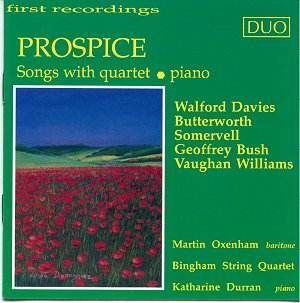BRITISH SONGS FOR BARITONE,
STRING QUARTET AND PIANO
WALFORD DAVIES
Prospice
BUTTERWORTH Love Blows as the
Wind Blows
ARTHUR SOMERVELL
A Broken Arc
GEOFFREY BUSH Farewell Earth's
Bliss
RALPH VAUGHAN WILLIAMS
Five Mystical Songs
 Martin Oxenham (baritone)
Martin Oxenham (baritone)
Bingham String Quartet
Katharine Durran (piano)
David Ayre (double bass)
rec 4-5 Aug 1992, Haberdasher's Aske's School, Elstree
 MERIDIAN DUOCD
89026 [75.12]
MERIDIAN DUOCD
89026 [75.12]
Crotchet

Meridian has been around for more than twenty years. Inconspicuously and
almost surreptitiously they have built a varied catalogue you would do well
to trace and trawl. In 1980 their double CD of rarely encountered Housman
settings first attracted my attention . Later their two CDs of Bernard Stevens'
pair of symphonies and string concertos uncovered a major 'misfit' composer.
Walford Davies is likely to remembered (by the generations listening in the
forties) for his talks about music on the BBC Third Programme. His music,
caught in the jet of time, has a contemporary profile only in relation to
Solemn Melody, RAF Marchpast and the anthem God Be in My
Head. The Walford Davies cycle (otherwise completely unknown) is quite
a discovery. There is a pride and an intoxication in this music which quite
transcends its ineradicable roots in Brahms and Dvorak.
Butterworth is best known for his Shropshire Lad-inspired music both
as an orchestral rhapsody and as a song cycle. Brian Rayner Cook broadcast
the W.E Henley cycle Love Blows as the Wind Blows during a generous
BBC Radio 3 series to celebrate the Vaughan Williams centenary in 1972.
Oxenham does not quite have Cooke's nostalgic, sun-warmed and burnished tone
but his is still no mean interpretation. There is also a version of this
work with full orchestra on Chandos. The Chandos is sung by Stephen Varcoe
but Varcoe's voice is a match for neither Oxenham's nor Cooke's.
The late Geoffrey Bush's succinctly expressed romanticism is little known.
While he has two symphonies and other orchestral and concertante works to
his name his clearest claim to attention is to be found in his songs. Many
of these have been recorded in three Chandos collections. His songs are for
varying forces including unaccompanied, with orchestra, with piano and, here,
with string quartet. Farewell Earth's Bliss is a title tapping into
a major and potent impulse in British music: the transience and glory of
life at high noon and at sunset. Delius, Bantock, Lambert (Bush dedicated
his Music for Orchestra to Lambert - ironically the Bush work is recorded
while Lambert's of the same title remains obstinately in waiting for its
recording premiere), Carey Blyton and Bax all grappled with the theme or
were gripped by it. Bush explores this vein with poignancy. The last two
songs echo his masterwork among the song collections: Summer Serenade
for tenor, choir and orchestra. Geoffrey Bush will, in years to come,
be seen as a true aficionado's choice amongst song composers in much the
same way as C.W. Orr.
The Somervell Housman settings are gravely over-rated in my opinion. Similarly
his Maud cycle. The heavy air and suffocation of propriety stifle
the expression of emotion. To some extent those shackles are cast off in
the Broken Arc. Worth hearing though not compelling stuff.
The Vaughan Williams Herbert settings are well known … but not in this
version. The original is for solo voice, chorus and orchestra. The compression
down to solo voice and small instrumental ensemble works unexpectedly well
and Oxenham is in good voice. That said the extra sense of exaltation which
comes from the choir is inevitably missed. RVW collectors will, all the same,
want this. It is the only recording of this version. Those who come to the
work via this disc will gain mightily from it but will be overwhelmed when
they hear the full choral/orchestral version.
Let's not overlook that this anthology is generously timed and that despite
a fuzziness in the printed booklet (not the first time I have noted this
defect in Meridian CDs) the notes are supportive and full texts are reproduced.
A disc for collectors of British song. I am confident that familiarity with
the Walford Davies will set singers and collectors exploring his many other
cycles and sets.
Rob Barnett

See also review by Lewis Foreman

